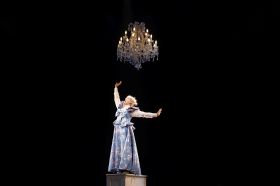Image courtesy Vivid Ideas
With close to three decades of professional experience now under their belt, Gen X women have left an indelible mark on how we impact our careers and creativity.
A Vivid Ideas panel – X Women: How Generation X Women Shape Creativity – tackled what that might look like today for Gen Z, and what the important lessons are that we can pass onto Millennials.
‘As Gen X women, we need to share our skills and our experiences, and make sure they are not mistaken for just paying our dues,’ said Melissa Webber, Founder and Managing Director of Holy Cow! Creative.
Her thoughts struck a chord with Chrissie Vincent, Head of Entertainment Management at Collarts, who said that 98 per cent of current enrolments are young women wanting to learn about the entertainment and music industry – a traditionally male-dominated industry.
‘The common theme is that these women, who are mostly Millennials, want one-on-one mentorship,’ said Vincent. ‘And Gen X are offering that.’
Emma Alberici, ABC Chief Economics Correspondent, continued: ‘Gen X have a lot to give, particularly to younger women, as we are the first generation that punched into those senior roles across organisations.’
A later panel talk, A Gender For Change, reported that 73 per cent of women surveyed this past year (Junkee Media) answered that they had experienced gender discrimination at work, and 75 per cent of the sample (both men and women) thought a glass ceiling for women still existed.
A further statistic revealed women would have to work an additional 56 days to match the same pay that men earned in a year in the same role.
Lisa Bora, partner and leader in KPMG’s Customer, Brand & Marketing advisory, said their research showed that we have yet to reach a 30 per cent target for board representation of women in Australian companies.
The same kind of disparity exists in the arts. Bora continued: ‘We need Gen Z to keep fighting the fight; we are not yet at the targets we want. I would love to see Gen Z pushing for more general representation on boards, not just of women but representation across ages, diversity, geography and skill sets.’
What Gen Z women can learn from their Gen X counterparts
Alberici believes that the most important gender change we will witness in the next five years will come out of the workplace.
‘We need to challenge what the perception of the workplace is,’ she said. ‘We need to completely change what a “good worker” looks like.’
‘The men are holding tight to the notion that a good worker is one who rocks up 7am and is still there 7pm – this whole idea of “presenteeism”.
‘Women can do things as well at 5am as they can at 7pm after they put kids to bed, so in order to be relevant, Gen Y needs to keep challenging the idea of what is a good worker – and that is someone who achieves good outcomes,’ Alberici said.
For Vincent, it was our very resilience as women working and making over several generations that has become our greatest lesson to share.
‘Gen X women should be teaching resilience – strength and determination – that is what we have worked really hard at,’ said Vincent.
‘My piece of advice back to Gen Z is to recognise patience; that is the way we have been raised – we are more compliant, quieter, and that also gets you somewhere,’ Bora continued.
What Gen X needs to recognise as lessons from Gen Z
When New Zealand Prime Minister Jacinda Ardern handed her down first budget she changed the metrics, so that GDP was not just about measuring economics, but also a measure of gross national happiness.
Bora observed: ‘I am very nervous about this generation, because while they are very connected, Gen Z also suffers a lot of loneliness. We need to teach them that it is not about volume, but show them the value of face-to-face connection.’
On the flipside, she said that Gen Y gives us a lot. ‘There is a bravery about their spirit which is wonderful.’
‘What I love about Gen Y is that they have a far more risk-taking appetite than us, and that is a really positive thing for us to take on as Gen X women.’
She continued: ‘They have a challenger mindset, and they are gifting us with an expansive view of the world.’
Bora said that the nature of Millennials is that they are less prepared to shoulder bullshit. ‘They are the first to call out when organisations or leaders have espoused values, but don’t enact them. They are going to be great business leaders – leaders that are performance driven, and not metrics driven,’ added Bora.
Smashing perceptions – what we can all learn
Vanessa Zuppicich is Creative Director at Rasic and Partners. She notes that while there has been a lot of talk about Millennials being digital natives, it is actually Gen X who are more connected.
‘The statistics show that Gen X are the most digitally connected of all gens; we are on social media 40 min more a week than Millennials, and we are not just using it to take selfies, but to build businesses.’
Alberici observed the enormous purge in newsrooms in recent years, and shifts in media generally, were example for a much broader negotiation between the generations; a territory that is largely not understood.
‘There is the feeling that old media channels is an old person’s pursuit … so we employ a bunch of young people. But the Gen X audience is the one that is most engaged, so there is this disconnect between the idea that you meet Gen Y where they are, and then somehow have to bring them back to the old way.
‘We are at this critical point where the media doesn’t know how to reach its audiences. That is what Gen Y can teach us; we have the content knowledge and know the angles to take because we know the market, but they can tell us how to reach people.’
It is this kind of collaboration across the generations that resounded with Zuppicich.
‘The real magic happens where you create the framework and mentorship but leave the freedom for them, Gen Y, to experiment.’ She adds: ‘Gen Y have great capacity to be multi-skilled.’
The panel concluded that while Gen X were the first generation [of women] to show and seize independence, it is important we don’t fall into the stereotypes of Gens.
In 2028 we will reach a tipping point when Gen X will become the primary consumption audience. It is up to Gen X women to learn to better wield that power now; and for Gen Y to use that momentum to create their own professional destiny as the women who follow them.






